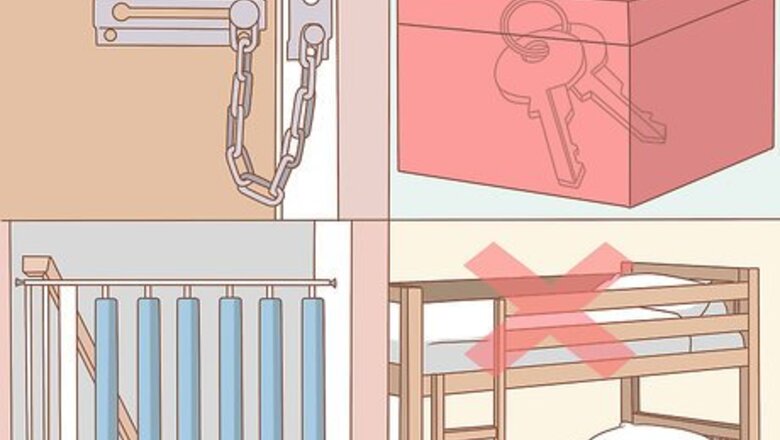
views
X
Research source
[2]
X
Trustworthy Source
National Health Service (UK)
Public healthcare system of the UK
Go to source
Reducing Danger During Sleepwalking
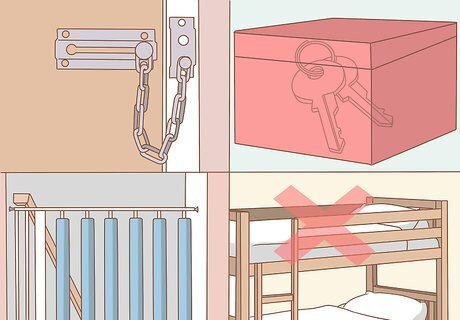
Prevent accidents during sleepwalking. Make the house as safe as possible to reduce the risk of sleepwalking injury. Because people who are sleepwalking can do complex activities, do not assume that they will wake up before doing something that requires coordination. Still, it doesn't hurt to take a few preventative measures. Try having the person sleep on the ground floor Put guard rails on the bed Put a sleepwalking child on the bottom bunk, not top bunk Lock doors and windows, especially upper-story windows Hide car keys Lock up and hide the keys to all knives and weapons Put a baby gate at the top of any stairs or fall hazards Remove tripping hazards If possible, set a security alarm that will go off and possibly wake the person if they try to leave Tip: Try having the sleepwalker's loved ones, not the sleepwalker, hide objects and arrange barriers. A sleepwalker is unlikely to get something if they don't know where it is, and a barrier may be more effective if the person doesn't have any "muscle memory" of putting it up or down while awake
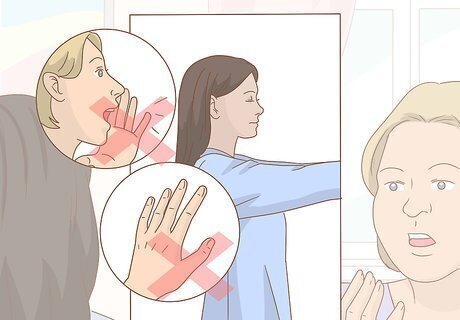
Talk to everyone in the household, including children, about how to handle sleepwalking. Seeing someone sleepwalk may be scary or confusing for people who don’t know what is going on. If they know what to do, they can handle it. Sleepwalkers can often be gently led back to bed. Sometimes talking to them helps. Avoid touching them too much and walk beside them at a short distance. It may be okay to gently turn them around towards their bed. Loved ones should avoid trying to wake the sleepwalker. Grabbing, yelling, or startling a sleepwalker is unlikely to work. In rare cases, it causes a violent reaction. Did You Know? Violence during sleepwalking is very rare. It usually happens when the person is approached or grabbed. Because the sleepwalker isn't awake, they don't have the presence of mind to stop themselves. Just in case, make sure your loved ones know to give you space and to step away if you seem agitated while sleepwalking.
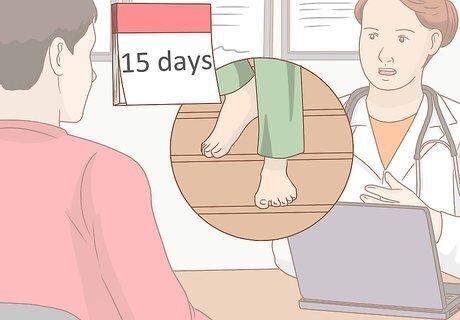
See a doctor if the sleepwalking is severe, dangerous, or shows signs of being related to an underlying condition. Sleepwalking can be dangerous, since the person might try to do unsafe things without realizing it. Tell a doctor if the sleepwalking: Occurs in a teen or adult Involves dangerous activities (like attempting to drive or jump out a window) Happens more than twice a week Is disrupting the household
Stopping Sleepwalking with Lifestyle Changes
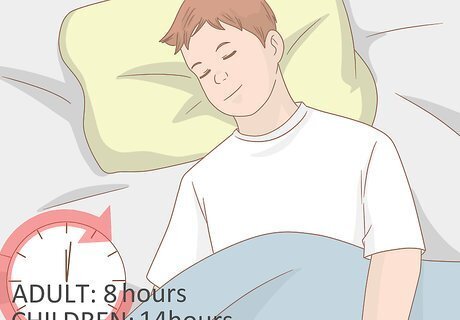
Sleep more. Being overtired can trigger sleepwalking. The average adult needs at least eight hours of sleep per night. Children may require as much as 14 hours, depending upon their age. You can reduce fatigue by: Taking short naps throughout the day Going to bed earlier Reducing your caffeine intake, especially in the afternoon Drinking less liquids before bed to reduce the chance of needing to use the restroom
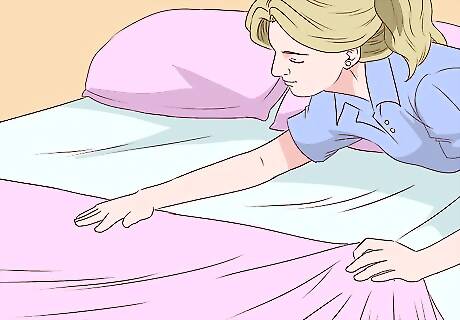
Follow a regular sleeping schedule. If you go to bed and wake up at about the same time each day, you're less likely to experience sleep abnormalities at night. Work on turning out the lights at the same time each night. If you like to use your phone in bed, install a blue light filter and an app blocker that blocks your favorite apps at a certain time at night. This will encourage you to go to sleep instead of losing track of time.

Avoid changing sleep medications or caffeine intake without a doctor's advice. Stick to the same routine. If you want to try a new sleep medication, even an over-the-counter one, consult your doctor first. Sleep violence may be more likely to occur when a person tries new sleeping drugs or suddenly increase their caffeine intake. (Though since these incidents are rare, it's hard to say.)
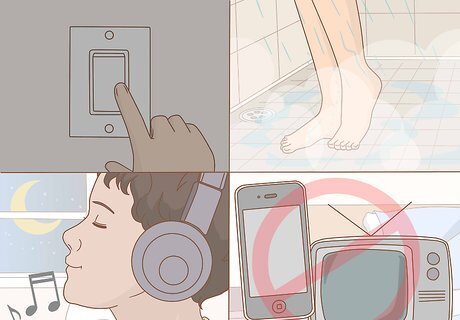
Relax before going to bed. Stress and anxiety can trigger sleepwalking. Establish a routine of relaxing before bed, or practice good "sleep hygiene." This could include any of the following: Keeping the room dark and quiet Taking a warm bath or shower Reading a book or listening to music Keeping the room cool Putting away screens before bed Using relaxation techniques before bed, such as visualizing calming places, meditation, deep breathing, progressively tensing and relaxing each muscle group in your body, massage, or yoga.
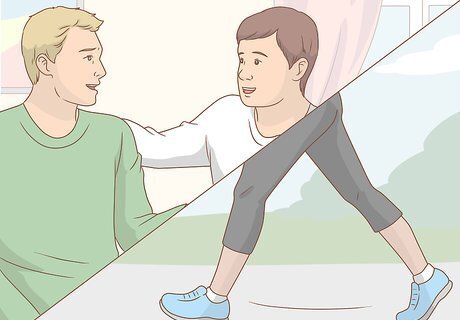
Improve your stress management skills. Develop healthy ways of coping with stress to prevent it from disturbing your sleep. Stress is frequently linked to sleepwalking. Find an exercise regimen that works for you. Your body releases endorphins which will help you relax and feel good. The relaxation will be most effective if you do something you enjoy. Try jogging, fast walking, swimming, or joining a community sports team. Keep close connections with friends and family. They can provide you with support and help you deal with the things that are causing anxiety. Join a support group or see a counselor if there are things you need to talk to about that you can’t tell friends or family. Your doctor may be able to recommend support groups or counselors that would fit your situation. Give yourself time to pursue hobbies that you enjoy. This give you something enjoyable to focus on and distract you from the things that are stressing you out.
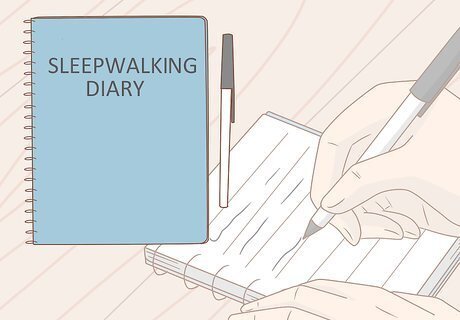
Keep a diary to track sleepwalking episodes. This may require someone else in the household to keep a record of how often and when in the night it occurs. Make a sleepwalking diary so all the information is in one place. Look for patterns and triggers. For example, if the person sleepwalks more when stressed, then you know that stress can lead to sleepwalking incidents.
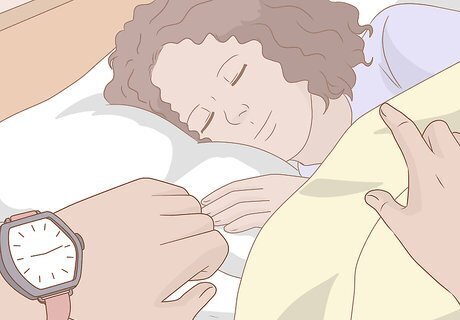
Try anticipatory awakening. If the person usually sleepwalks at the same time each night, they can be woken before that time to reduce the chance of sleepwalking. A loved one or alarm clock can do the waking. The person should be woken about 15 minutes before the typical sleepwalking time and should then stay awake for about five minutes. This disrupts the sleep cycle and may cause the person to go into a different sleep stage when falling back asleep, preventing the sleepwalking.

Reduce your alcohol consumption. Alcohol can cause sleep disturbances and may trigger sleepwalking. Avoid drinking alcohol before bed. Women and men over 65 should drink no more than one drink per day. Men under 65 should have no more than two drinks per day. Do not drink if you are pregnant, have been diagnosed with alcoholism, have had problems with your heart, liver, or pancreas, have had a stroke, or are on medications that may interact with alcohol.
Seeking Medical Help

Ask your doctor if any of the person's medications may cause sleepwalking. Some medications may disrupt people's sleep cycles and cause sleepwalking. Your doctor may be able to recommend a different medication that will still treat your health problem but reduce the sleepwalking too. Medications that may cause sleepwalking as side-effects include: Sedatives Medications for psychiatric conditions Short-acting hypnotics Did You Know? Some medications can have serious side effects if stopped abruptly. Always talk to a doctor before stopping a medication. They can tell you whether and how to taper off the medication.
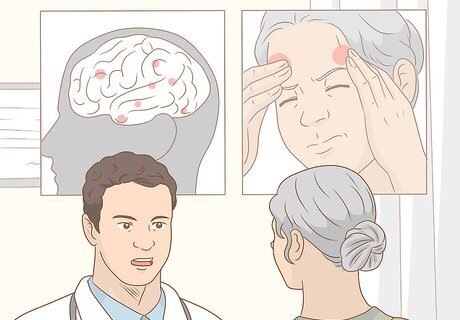
Talk to your doctor about whether your sleepwalking could be a symptom of another underlying condition. Though most sleepwalking is not a sign of a more serious condition, there are a few conditions that may trigger sleepwalking: Partial complex seizures Brain disorders in the elderly Anxiety Depression Narcolepsy Restless legs syndrome Gastroesophageal reflux disease (GERD) Migraines Hyperthyroidism Head injuries Strokes A fever over 101°F (38.3°C) Abnormal breathing patterns while you sleep, such as obstructive sleep apnea
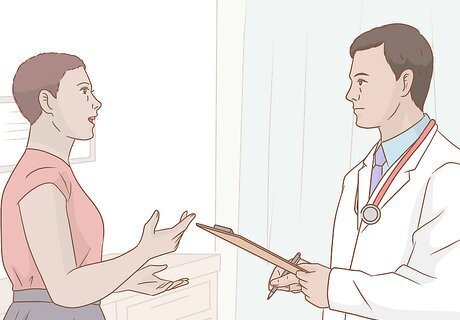
Talk to your doctor about stress management. If you've been struggling with stress, talk to your doctor about what's going on and ask for recommendations. They can advise you on lifestyle adjustments or even medical treatments to help you better cope with life's challenges.

Get tested for a sleep disorder. This will probably require sleeping in a sleep lab. A sleep lab is a laboratory where a person spends the night and a team of doctors run a polysomnogram. Sensors will be connected from their body (usually stuck to the temples, scalp, chest, and legs) to a computer that will monitor sleep. The doctors will measure: Brain waves Blood oxygen levels Heart rate Breathing rate Eye and leg movements

Ask your doctor about medications. In some cases, your doctor may prescribe medications to deal with the sleepwalking. The following are sometimes prescribed: Benzodiazepines, which generally have sedative effects Antidepressants and/or anti-anxiety medication if you are dealing with too much stress












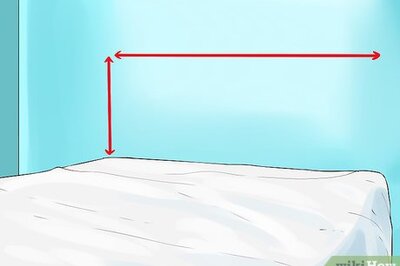






Comments
0 comment